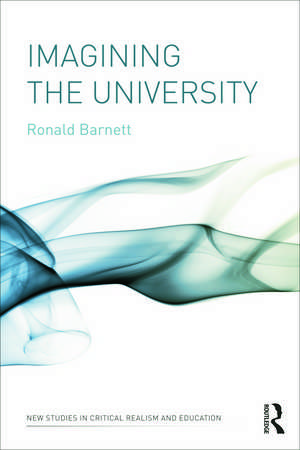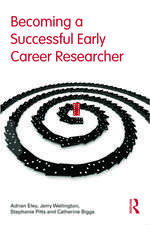Imagining the University: New Studies in Critical Realism and Education (Routledge Critical Realism)
Autor Ronald Barnetten Limba Engleză Paperback – 11 dec 2012
Imagining the University forensically examines this situation, critically interrogating many of the current ideas of the university. Imagining the University argues for imaginative ideas that are critical, sensitive to the deep structures underlying universities and are yet optimistic, in short feasible utopias of the university. The case is pressed for one such idea, that of the ecological university. The book concludes by offering a vision of the imagining university, a university that has the capacity continually to re-imagine itself.
| Toate formatele și edițiile | Preț | Express |
|---|---|---|
| Paperback (1) | 377.52 lei 3-5 săpt. | +16.39 lei 4-10 zile |
| Taylor & Francis – 11 dec 2012 | 377.52 lei 3-5 săpt. | +16.39 lei 4-10 zile |
| Hardback (1) | 1111.87 lei 6-8 săpt. | |
| Taylor & Francis – 11 dec 2012 | 1111.87 lei 6-8 săpt. |
Din seria New Studies in Critical Realism and Education (Routledge Critical Realism)
-
 Preț: 399.55 lei
Preț: 399.55 lei -
 Preț: 408.45 lei
Preț: 408.45 lei -
 Preț: 468.36 lei
Preț: 468.36 lei -
 Preț: 363.03 lei
Preț: 363.03 lei -
 Preț: 406.42 lei
Preț: 406.42 lei -
 Preț: 389.66 lei
Preț: 389.66 lei -
 Preț: 360.99 lei
Preț: 360.99 lei - 17%
 Preț: 259.98 lei
Preț: 259.98 lei
Preț: 377.52 lei
Nou
Puncte Express: 566
Preț estimativ în valută:
72.24€ • 75.61$ • 60.13£
72.24€ • 75.61$ • 60.13£
Carte disponibilă
Livrare economică 10-24 martie
Livrare express 21-27 februarie pentru 26.38 lei
Preluare comenzi: 021 569.72.76
Specificații
ISBN-13: 9780415672047
ISBN-10: 041567204X
Pagini: 200
Ilustrații: 2 black & white illustrations, 2 black & white line drawings
Dimensiuni: 156 x 234 x 13 mm
Greutate: 0.29 kg
Ediția:New.
Editura: Taylor & Francis
Colecția Routledge
Seria New Studies in Critical Realism and Education (Routledge Critical Realism)
Locul publicării:Oxford, United Kingdom
ISBN-10: 041567204X
Pagini: 200
Ilustrații: 2 black & white illustrations, 2 black & white line drawings
Dimensiuni: 156 x 234 x 13 mm
Greutate: 0.29 kg
Ediția:New.
Editura: Taylor & Francis
Colecția Routledge
Seria New Studies in Critical Realism and Education (Routledge Critical Realism)
Locul publicării:Oxford, United Kingdom
Cuprins
Introduction Part I: Imagining the university 1. Losing, and regaining, the imagination 2. Perchance to dream 3. Valuing the imagination Part II: Structuring the imagination 4. Axes of the imagination 5. Sightings of the imagination Part III: Forms of the imagination 6. The ideological imagination 7. The dystopian imagination 8. The persuasive imagination 9. The utopian imagination Part IV: Being imaginative 10. Criteria of adequacy 11. Imagining the ecological university 12. The imaginative university Coda: A forgetting of air?
Recenzii
"Ronald Barnett, one of the world’s leading defenders of the university, calls upon us to free our imaginations in order to engage in the contemporary debate about university futures: what could and should it become? In Imagining the University he masterfully examines the form and structure of imagination in order to re-examine the concept of the public university to expand, contemplate and evaluate possibilities, and to assert and theorize the ecological university. This work is bound to become a classic within the genre." Professor Michael Peters, University of Waikato, New Zealand and Emeritus, University of Illinois
"Universities, as Ronald Barnett has reminded us in a series of influential books, have always existed in the mind as well as on the ground. This is one explanation of their resilience, their ability to re-invent themselves, and their wide cultural appeal. Progress is enabled by acts of collective imagination. In this latest book, Barnett delicately probes how such acts originate, are evaluated and can succeed." David Watson, Professor of Higher Education and Principal of Green Templeton College, Oxford
"The University has always been a place for imagination. This book offers a most timely critical account of the current state of imagining the modern University itself and opens up horizons for the public debate about the ‘good university’. It covers a wide expanse of concepts and ideas for the modern university and develops and applies tools for their assessment. It is academically stimulating and practically relevant, and I am sure it will become a key text about our universities and their future development."
Prof Jürgen Enders, Center for Higher education Policy Studies, University of Twente, NL
"In these uncertain times for higher education, Ron Barnett’s latest book invites us to ‘imagine’ a variety of possible futures for universities. In doing so, he presents us with his thoughts on the diversity of what is and has been ‘the university’ alongside his thoughts about the diversity of what could be ‘the university’, or in the author’s words, “the possibility of possibilities”. The reader is presented with many ‘imaginations’ from which to choose though the author’s sympathies for the ‘utopian’ form are pretty clear. This book is a good read, an important read, and a read that will change things. I strongly recommend it."
John Brennan, Emeritus Professor of Higher Education Research at the Open University and a Visiting Professor at the University of Bath and London Metropolitan University.
"The function of the future of universities is being discussed now much more than at any point over the past half-century. In imagining the university, Ron Barnett challenges us to move beyond the established models of a university and to dare, intellectually and socially, to think better about what a university can and should be. This book should be compulsory reading for everyone interested in universities."
Professor Michael Worton, Vice-Provost, University College London.
"Universities, as Ronald Barnett has reminded us in a series of influential books, have always existed in the mind as well as on the ground. This is one explanation of their resilience, their ability to re-invent themselves, and their wide cultural appeal. Progress is enabled by acts of collective imagination. In this latest book, Barnett delicately probes how such acts originate, are evaluated and can succeed." David Watson, Professor of Higher Education and Principal of Green Templeton College, Oxford
"The University has always been a place for imagination. This book offers a most timely critical account of the current state of imagining the modern University itself and opens up horizons for the public debate about the ‘good university’. It covers a wide expanse of concepts and ideas for the modern university and develops and applies tools for their assessment. It is academically stimulating and practically relevant, and I am sure it will become a key text about our universities and their future development."
Prof Jürgen Enders, Center for Higher education Policy Studies, University of Twente, NL
"In these uncertain times for higher education, Ron Barnett’s latest book invites us to ‘imagine’ a variety of possible futures for universities. In doing so, he presents us with his thoughts on the diversity of what is and has been ‘the university’ alongside his thoughts about the diversity of what could be ‘the university’, or in the author’s words, “the possibility of possibilities”. The reader is presented with many ‘imaginations’ from which to choose though the author’s sympathies for the ‘utopian’ form are pretty clear. This book is a good read, an important read, and a read that will change things. I strongly recommend it."
John Brennan, Emeritus Professor of Higher Education Research at the Open University and a Visiting Professor at the University of Bath and London Metropolitan University.
"The function of the future of universities is being discussed now much more than at any point over the past half-century. In imagining the university, Ron Barnett challenges us to move beyond the established models of a university and to dare, intellectually and socially, to think better about what a university can and should be. This book should be compulsory reading for everyone interested in universities."
Professor Michael Worton, Vice-Provost, University College London.
Descriere
Imagining the University seeks to address each of the issues facing higher education and does so by first, identifying a very wide range of ideas of the university as it is now unfolding and could become; secondly, by evaluating those conceptions of the university with a classification of ideas of the university; and thirdly, by reflecting on the imagination itself, its current impoverishment and its possibilities. Whether studying, researching or deciding policy, this book is vital reading to all those involved in the planning and delivery of higher education.











